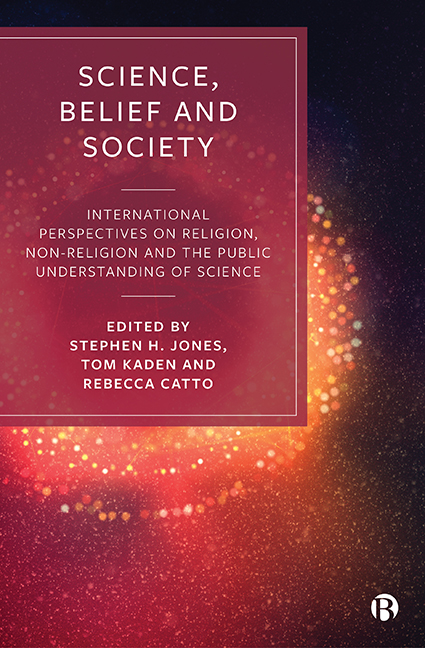 Science, Belief and Society
Science, Belief and Society Book contents
- Frontmatter
- Contents
- List of Figures and Tables
- Notes on Contributors
- Editors’ Acknowledgement
- Foreword
- Editors’ Introduction: Science, Belief and the Sociological Tradition
- PART I Methodological Challenges in the Study of Science and Belief
- PART II Belief in the Study of Science and Technology
- PART III Science, Culture and Non-religion
- PART IV Religion, Conflict and Moderation
- Conclusion: Future Directions in the Sociological Study of Science and Belief
- Index
10 - Atheism and the Social Sciences
Published online by Cambridge University Press: 27 April 2022
- Frontmatter
- Contents
- List of Figures and Tables
- Notes on Contributors
- Editors’ Acknowledgement
- Foreword
- Editors’ Introduction: Science, Belief and the Sociological Tradition
- PART I Methodological Challenges in the Study of Science and Belief
- PART II Belief in the Study of Science and Technology
- PART III Science, Culture and Non-religion
- PART IV Religion, Conflict and Moderation
- Conclusion: Future Directions in the Sociological Study of Science and Belief
- Index
Summary
Introduction
In the past decade, the anti-religious movement known as the New Atheism has been working to define a scientific basis for opposing religion and its influence in public affairs. Their thought on religion is rooted in scientism and a narrative of progress and Enlightenment that refers to ideas derived from evolutionary biology for its authority. A notable feature of this approach is the New Atheism's critique of the social sciences, which it dismisses as a relativistic domain of knowledge associated with postmodernism, and seeks to replace with evolutionary psychology and neuroscience. This chapter examines the New Atheism's position in terms of a historical division within atheist thought between approaches to religion that are grounded in the natural and social sciences, and argues that contemporary atheism should be understood primarily as a political project to advance the authority of an ideological vision of ‘true’ science and its representative experts.
The New Atheism is a cultural and intellectual movement originally consisting of the ‘Four Horsemen’ (as they were dubbed by their admirers): evolutionary biologist Richard Dawkins; philosopher Daniel Dennett; journalist Christopher Hitchens; and Sam Harris, a public intellectual with no significant credentials before he wrote The end of faith in 2004 (Harris, 2004), which became an unexpected bestseller and kick-started the movement. A number of other figures came into the fold, mostly consisting of professional scientists and public intellectuals, and a new social movement coalesced around their ideas that sought a place for atheists in public discourse (LeDrew, 2015).
While typically understood as a response to religious fundamentalism, the New Atheism is as much a reaction to a perceived weakening of universalistic standards of knowledge and morality in an increasingly pluralistic Western cultural milieu. Most of the criticism of the New Atheists has concerned their ideas about religion, including some gross generalizations about believers, and a generally hysterical attitude towards Islam and practising Muslims in particular, which are presented as a dire existential threat to Western civilization. The New Atheists’ ideas about the social sciences have not received as much attention, though their books and public comments contain a strong and consistent critique of sociology and philosophy, in particular, as bastions of relativism that undermine scientific authority and, by extension, the entire project of liberalism, which they see as a direct outcome of scientific progress.
- Type
- Chapter
- Information
- Science, Belief and SocietyInternational Perspectives on Religion, Non-Religion and the Public Understanding of Science, pp. 223 - 238Publisher: Bristol University PressPrint publication year: 2019


